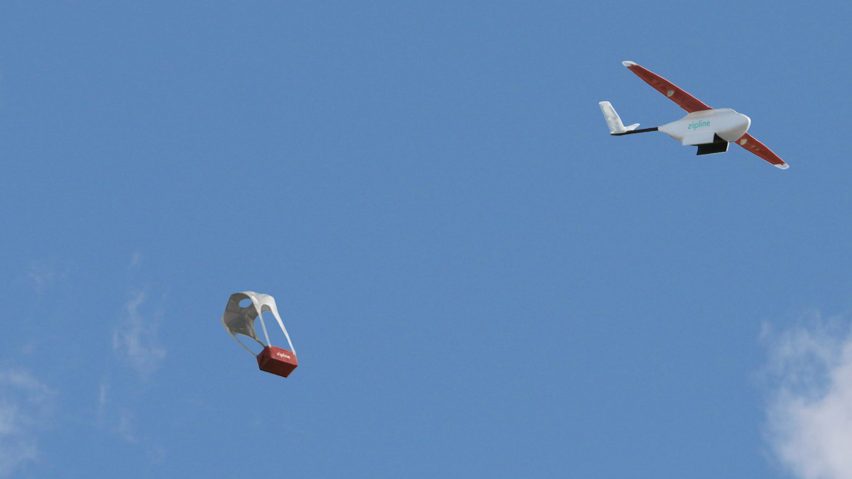Drones that deliver blood with parachutes and a sustainable ocean farming system are among the winners of the INDEX: Award 2017.
Run by Danish non profit organisation INDEX: Design to Improve Life, the awards programme highlights life-changing designs within five categories: people's choice, community, home, work, body, and play and learning.
The winners were selected from among 1,401 entries submitted by designers in 85 countries, by a panel of 11 judges.
These judges included Paola Antonelli, curator of design and architecture at MoMA in New York, dean of Aalto University School of Art, Design and Architecture in Finland Anna Valtonen, and Ravi Naidoo, founder and managing director of Interactive Africa.
The winner of the people's choice award is Labster, a virtual reality lab developed by Mads Tvillinggaard Bonde and Michael Bodekaer in 2012, which provides high-quality immersive scientific lessons.
Functioning as an online teaching platform, the virtual lab is an affordable solution for science students who don't have or can't afford access to a physical lab but need to gain experience.
Labster features 64 different simulations with a virtual mentor covering a broad range of scientific fields including biology, chemistry, engineering, general sciences, medicine, and physics.
Recently rewarded with $5 million (approximately £7 million) in grants to develop virtual reality laboratories for better STEM education, Labster is currently used at Stanford University in California and The University of Copenhagen.
The community award goes to Ethereum – an open software platform that enables developers and designers to build and run almost any decentralised application.
Ethereum was designed by Canadian-Russian programmer Vitalik Buterin, alongside an international team of developers, for Swiss nonprofit organisation the Ethereum Foundation. It can be used to make applications like new electronic payment systems, social networks and online voting platforms.
The software is built on "smart contracts" – a computer code that can facilitate the exchange of money, property, content or anything of value, and has the potential to replace many of the centralised systems currently in use.
The system also allows you to be in full control of your online data, so it can't be hacked, lost or used without your permission.
"Ethereum is a world-changing technology that represents nothing less than the second generation of the Internet," said INDEX. "It holds the potential to transform law, governance, finance, trade and social organization."
In the home category, a new global addressing system takes first prize. Called What3words, the system works by dividing the world into 57 trillion 3x3m squares and assigning each with three unique words.
Easy to remember, the three words are able to specify locations more precisely than street addresses or long-winded GPS numbering systems. Founded by three friends Chris Sheldrick, Jack Waley-Cohen and Mohan Ganesalingham in 2013, the system was designed to "put everyone on the map to ensure they're recognised, identified and found."
What3words is currently being used by the postal services of Mongolia, Djibouti, Tonga, Saint Martin, and Côte d'Ivoire, and by the United Nations (UN), the Red Cross and other emergency response and humanitarian organisations around the world.
Revolutionary ocean farming system GreenWave scoops the work category prize for its ability to restore ocean ecosystems, mitigate climate change, and create jobs for fishermen, while also providing healthy, local food for communities.
Made up of differently shaped nets, including mussel "socks", and oyster cages for farming shellfish and seaweed, the farm is anchored to the ocean floor, making it hurricane proof.
Each net houses different species and floats at different depths each one carefully selected to address a certain environmental challenge. For instance oysters are able to balance nitrogen levels through a natural filtration process, and fast growing seaweed can soak up five times more carbon dioxide than land-based plants.
The GreenWave farms are easily scaleable and can be shared on an open source basis with fishermen who can produce food, biofuel, fertilizer, animal feed, and cosmetics from their crops.
Following on from designs such as the Edible Pouncer drone and Ambulance Drone, the INDEX award winner in the body category is Zipline, the world's first commercial medical supplies drone delivery system.
Designed to deliver critical medical supplies, such as blood and vaccines, to where they're needed quickly, Zipline was designed by a team of Harvard graduates who worked together with the Rwandan Government to develop the system.
Using a mobile phone, health workers in remote areas are able to text an order with Zipline for the medical products they need (up to 1.5 kilos worth) and have them parachuted in within minutes from a drone. Each drone can can fly 500 deliveries in 24 hours.
Zipline's goal is to put all of Rwanda's 12 million citizens within a 15 to 35 minute delivery range of any essential medical product.
"This is a great systemic interplay of designers, governments and society bringing the bestsellers first-world technology to the poorest," said jury member Ravi Naidoo.
Finally, the winner of the play and learning category is a 20-cent hand-powered centrifuge made from simple household materials.
A centrifuge is a machine with a rapidly rotating container that separates fluids of different densities. Centrifuges are essential for diagnosing highly infectious diseases such as Malaria, HIV, and Tuberculosis.
Based on the design of a 5,000-year-old toy, a spinning button on a string known as a "whirligig", the Paperfuge works just like a traditional centrifuge but is made from paper, string, and plastic.
It weighs about two grams, making it much lighter and faster than its expensive competitors, and more suitable for transport and distribution. The design was developed by Manu Prakash, Saad Bhamla at Stanford University.
Established in Denmark in 2002, the INDEX: Design to Improve Life organisation was set up promote the application of design and design processes to improve vital areas of people's lives.
As well as the annual awards programme, the NPO also organises design education workshops in Danish cities, and provides selected designers and statues with business strategy guidance and connections to investors.

